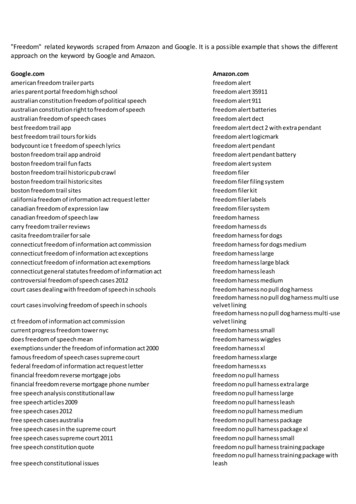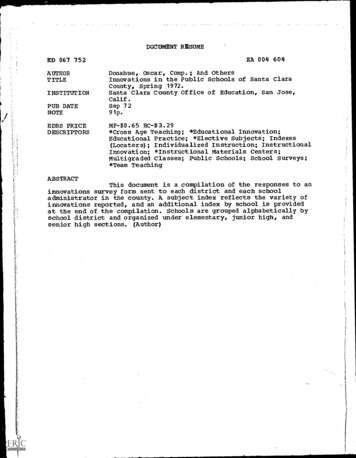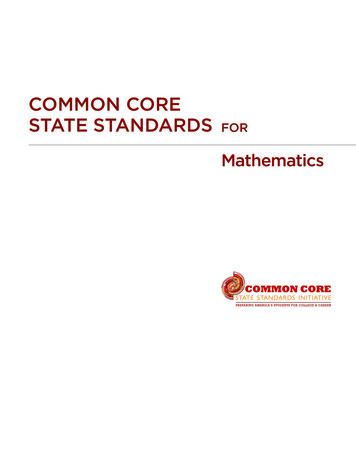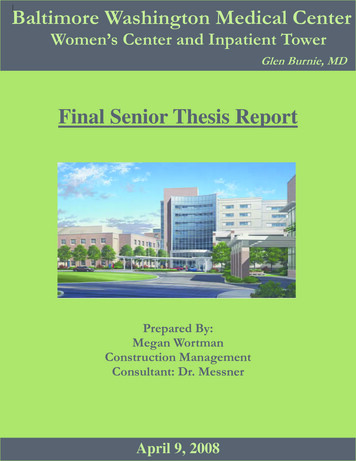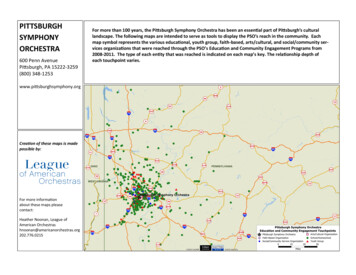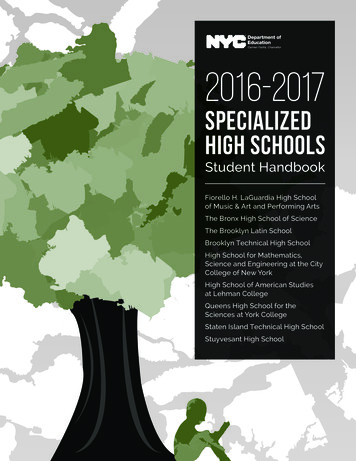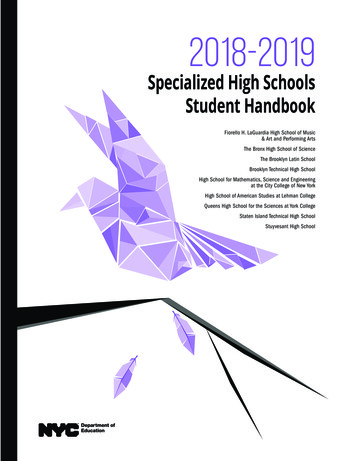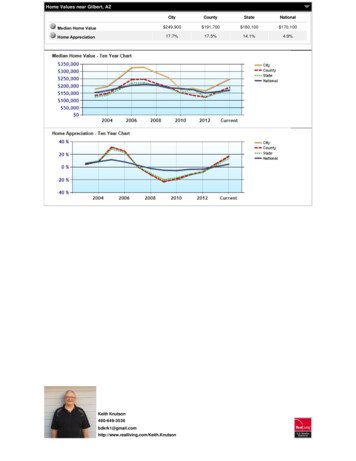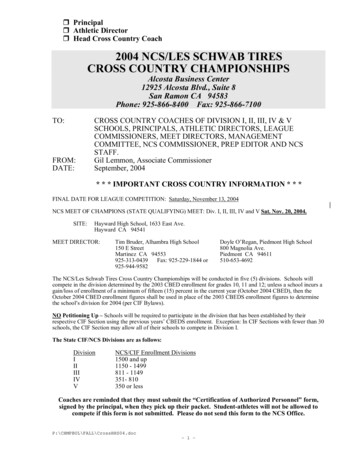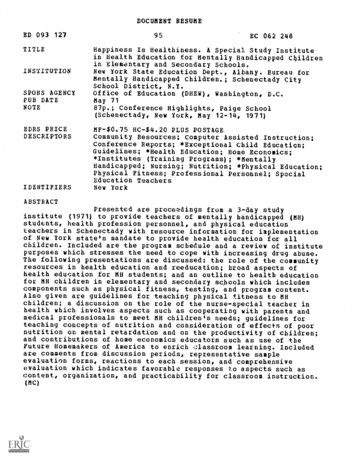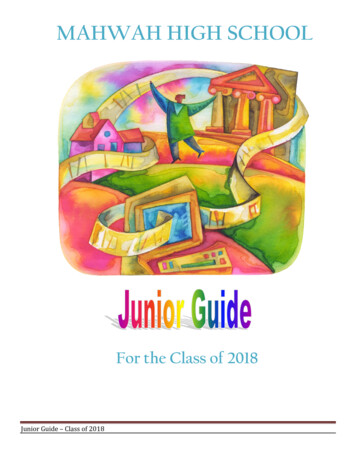
Transcription
MAHWAH HIGH SCHOOLFor the Class of 2018Junior Guide – Class of 2018
Dear Juniors:Who are you? Where are you going? Should you go to college, a technical school, or to work? Should you join theArmed Services? What jobs can you get as a high school graduate?These are all normal questions for the young adult about to graduate from high school. At this point in yourdevelopment, final answers to these questions are not expected of you. However, tentative answers are important.The types of training open to you are more varied than ever before. There are some guidelines that may helporganize your decision-making strategy:1.2.3.4.Know yourself; identify your assets and your weakness;Gather information on alternatives;Set realistic goals or objectives;Formulate your plans with your counselor.THIS is the time to plan for the future! Senior year is NOT the time to begin the college process or to start tothink about what you are going to do after high school! Get started now! The Guidance Department is alwaysavailable to help. We look forward to working with you as you plan the next important step in your life’s journey!Dominick J. Gliatta, Director of GuidanceMrs. Jo Ann Barnard, CounselorMrs. Dianna Farquharson, CounselorMr. Rayhan Jalil, CounselorMrs. Stacy Mandel, 62-2314201-762-2317Mrs. Nancy Mariani, Administrative AssistantMrs. Denise Wright, Administrative Assistant201-762-2311201-762-2312WHAT COUNTS IN COLLEGE ADMISSIONS High School Transcript: The rigor of your classes and how you performed is the BIGGEST factorin the college admissions process GPA Standardized Test Scores Personal Essay and additional writing pieces, if applicable Recommendations (counselor and teachers) Extracurricular/Community Activities/Summer Programs Interview, if requiredJunior Guide – Class of 2018Page 1
SAT REASONING TEST AND SAT SUBJECT TESTSTest DatesRegistration DeadlinesRegularLate Fee RequiredJanuary 21, 2017December 21, 2016January 10, 2017March 11, 2017February 10, 2017February 28, 2017May 6, 2017April 7, 2017April 25, 2017June 3, 2017May 9, 2017May 24, 2017*August 26, 2017*July 28, 2017*August 11, 2017*October 7, 2017*September 8, 2017*September 22, 2017*November 4, 2017*October 6, 2017*October 20, 2017*December 2, 2017*November 3, 2017*November 17, 2017* Dates are subject to change and are estimated based on general patterns from previous years. This will mark thefirst year that College Board has added an August test date and eliminated the test date in January.ACTTest DatesRegistration DeadlinesRegularLate Fee RequiredFebruary 11, 2017January 13, 2017January 14-20, 2017April 8, 2017March 3, 2017March 4-17, 2017June 10, 2017May 5, 2017May 6-19, 2017September 9, 2017TBDTBDOctober 28, 2017TBDTBDDecember 9, 2017TBDTBDSEE APPENDIX A FOR SAT/ACT COMPARISONSJunior Guide – Class of 2018Page 2
TEST PREP OPTIONSMethod Test Prep in Naviance: Mahwah High School has provided you with access to Method TestPrep, an online course that helps students build their math, reading, writing, and SAT/ACT test prepskills. By clicking on the Method Test Prep link in your Naviance account you can start using our onlineprogram immediately. The course will keep track of all the work you have completed.You can listen to math, verbal and writing tutorials and each tutorial is accompanied by a quiz to testmastery. The program is highly intuitive and keeps track of your strengths and weaknesses. You haveaccess to a large pool of practice questions and receive instant feedback upon completion of eachquestion. This feedback includes easy-to-understand explanations as well as video and audio to help alltypes of learners better understand the concepts.Khan Academy: Khan Academy is a non-profit educational organization created in 2006 by educatorSalman Khan with a goal of creating an accessible place for people to be educated. The organizationproduces short lectures in the form of YouTube videos. www.khanacedemy.orgClasses Offered at Mahwah High School: See your counselor for more information.CollegeBoard.com: You can use your PSAT score report to develop a personal plan for improvement.SUMMER PROGRAMSSummer Programs are great enrichment opportunities for exploring interests and potential college majors. New Jersey Institute of Technology: www.njit.edu/precollegeo Scienceo Technologyo Engineeringo Mathematicso BusinessSummer Expeditions: www.academictreks.comWilderness Adventures: www.gobroadreach.comDrew University: www.drew/edu.summerSummer Programs in England, France and Spain: www.oxbridgeprograms.comNew York University: www.nyu.edu/info/precollege/infoSchool of the Visual Arts: ogram/summer-programRamapo College: www.ramapo.edu/cipl/youth/William Paterson University: q YouthHighRustic Pathways: https://rusticpathways.com/programs/OR do a simple Google search ”college summer programs” for interesting and educational summerexperiences. If you have any questions, see Mr. Gliatta in the Guidance Office.VOLUNTEERINGDo you want to give back to the community by Volunteering? It looks great on a college resume! Check outthese sites or see Mrs. Mandel (smandel@mahwah.k12.nj.us) in guidance for other ideas: www.bergenvolunteers.org www.kidsthatdogood.com www.volunteernewjersey.org/ www.iparticipate.org/By completing the necessary paperwork, you can even earn high school credits for your volunteer efforts!Junior Guide – Class of 2018Page 3
HOW TO RESEARCH A COLLEGE --FAMILY CONNECTION (NAVIANCE)Naviance is THE BEST place to start the process. Naviance is better than other search tools because itcompares you to other Mahwah High School students. Naviance is a comprehensive website thatstudents and parents can use as a tool in planning for college. Some of the features to explore are: College Lookup: This research tool provides comprehensive information on thousands of colleges. Inaddition to general and admissions information, further data is presented on academics, cost andfinancial aid, student body characteristics, extracurricular and athletic programs. A link to eachcollege’s website is provided. For colleges to which Mahwah students have applied, numbers applying,admitted, and enrolled are shown, with a link to a “scattergram” graph. College Search: Enter criteria such as size, location, cost, availability of specific majors or athleticprograms, and students can produce a list of colleges that meet their criteria. Acceptance History: This feature shows all colleges to which Mahwah students have been accepted, aswell as the number of students accepted and number enrolling at each. Scattergrams (SEE APPENDIX D): A graphical view of application outcomes (accepted, denied,waitlisted) at a college for recent Mahwah HS applicants, using GPA and SAT scores. Students cangauge their chances of acceptance by comparing personal GPA/SAT numbers with those of successfulapplicants. Visit Schedule: As college representatives schedule information sessions at Mahwah HS, these areposted online. Click on Visit Schedule, or view the page of a particular college to see whether a sessionis scheduled. Students can sign up for a visit with Naviance.TYPES OF COLLEGESThere are over 3,000 colleges and universities in the United States and most of these differ in many respects.Here are the most common types: Liberal Arts Colleges: Most four-year liberal arts colleges offer undergraduate degrees and focus onproviding a broad exposure to a science and humanities curriculum. [Wesleyan (CT), Amherst (MA),Smith (MA), Mount Holyoke (MA), Bryn Mawr (PA), Middlebury (VT)]. Universities: Universities offer both undergraduate and graduate degrees and are traditionally brokenup into smaller colleges which specifically address the academic interests of their students. Universitiescan range from 3,000 to 50,000 students. [Ohio State University (40,000 students), Rutgers University(28,000), University of Michigan (26,000) , University of Rhode Island (13,000), University of NewHampshire (12,000), East Stroudsburg University (6,000), Bentley University (4,235), BrandeisUniversity (3,500)]. Specialized Colleges: These are degree granting colleges which offer specialized programs in majorssuch as engineering, business and the arts (Rhode Island School of Design, Juilliard, BostonConservatory, Albany College of Pharmacy, and University of the Sciences in Philadelphia). Junior Colleges; Community Colleges: Most offer two years of college-level work. The students maypursue a two-year associate’s degree and/or continue their education at a four-year college. (BergenCommunity, Rockland Community). Other Post-Secondary Schools: Some schools offer programs in art, culinary sciences, auto and dieselmechanics, heating and refrigeration, electrical, technical, computer repair etc. [DeVry TechnicalInstitute, Berkeley College of Business, Lincoln Tech (Diesel Mechanic, Heating and Refrigeration,Culinary)] HOW TO CHOOSE A COLLEGEProgram: Do you know what you want to major in? Does the school have strong offerings in that area?Do you want a career-oriented school, i.e. engineering, art, or a general liberal arts program?Profile: Do you fit the profile of the school, i.e. standardized test scores, GPA, rank? Use the collegeprofile in the college guidebooks, and the Naviance program.Junior Guide – Class of 2018Page 4
Location: Do you plan to commute? How far from home are you willing to go? Do you prefer a rural,suburban, or urban campus?Size: Have you visited schools of different sizes and decided on a preference?Finances: What are the costs of the school? Is financial aid need-blind? Does the school havecooperative education programs?Quality of Life: Do most students live on campus? Do many students leave on weekends? What kindsof housing are available? For how many years is housing guaranteed?Extracurricular Activities: Will you be able to play the sports you like, take part in musical ortheatrical productions or pursue other activities you most enjoy?Student Body: Is the student population diverse in ethnic and socioeconomic background? Do you seeyourself as a “fit” both academically and socially?COLLEGE VISITSThe best way to see if a college is right for you is to go visit. Call the admissions office and make anappointment for a campus tour. Juniors are permitted two excused absences for college visits (seniors areallowed four) but must obtain approval from their Guidance Counselor at least two days prior to thevisitation. All visits must be completed by May 5, 2017.THE APPLICATION LISTThe scattergram feature in Naviance is an AMAZING tool to determine which category a particular school fallsin for you. (SEE APPENDIX D) Reach Schools: A school one is aspiring to attend, but one’s academic profile may not meet all of theadmissions’ criteria established by the specific school (i.e. SAT scores, class rank, and/or GPA.). A reachschool may also be one which is so highly competitive that it is very difficult to predict acceptance. Realistic Schools: A school where the applicant’s profile lies comfortably within the range of criteria.Likely Schools: A school where admission appears very likely (i.e. SAT scores, class rank and GPA arewithin the high end or exceed the admissions’ criteria). ADMISSION TERMS AND PROCESSESRegular Admissions: The college reviews the admissions folder and returns a decision on a specifieddate. This is a non-binding application and deadlines vary by school.Rolling Admissions: The college reviews the admissions folder as soon as all information is completeand returns a decision in a timely fashion on a “rolling” basis (no specific date).Early Decision: The student applies to his/her first choice school by a specified date early in the fall andsigns a binding agreement to enroll in that college if offered admission. Students can be deniedadmission or deferred to the regular applicant pool. Early Decision is intended for students who have adefinite first choice school to which they are ready to make a commitment if accepted. Please speak toyour counselor about completing additional applications.o Some colleges offer Early Decision 1 and Early Decision II; both are binding agreements.Early Action: This is a non-binding decision which follows the same timetable as Early Decision butallows candidates until May 1 to accept or decline. Students can be accepted, deferred to the regularpool or denied admission outright (not be deferred to regular admissions pool).Priority Deadlines: Some large universities have priority deadlines. Completed applications receivedbefore the priority deadlines are more favorably looked upon.***Only Early Decision applicants must confirm attendance by placing a deposit per college instructions;all other students must commit to their college by placing a deposit with the admissions office by May 1st.Junior Guide – Class of 2018Page 5
FINANCIAL AID INFOFAFSA: The FAFSA is available on October 1, 2017, three months earlier than it was available historically.Additionally, prior-prior year income is reported, meaning 2016 income is used for the 2018–19 FAFSA. Whatdoes this mean? Students can get a head start and begin filing their financial aid forms starting in October. FAFSA availability now aligns with the CSS PROFILE availability on October 1.Students and families can easily fill out the income section on their FAFSA using the IRS Data Retrieval Toolbecause 2016 taxes are already complete. Estimating income prior to completing a tax return is no longernecessary.The Net Price Calculator: (http://netpricecalculator.collegeboard.org/) is a tool that you can use to estimateyour “net price” to attend a particular college or university. Net price is the difference between the “sticker”price (full cost) to attend a specific college, minus any grants and scholarships for which you may be eligible.Sticker price includes direct charges (tuition and fees, room and board) and indirect costs (books and supplies,transportation, and personal expenses).How does it work?1. First, the Net Price Calculator looks at the sticker price.2. Then, using the financial information you enter into the calculator, the Net Price Calculatorestimates the amount of money your family would be expected to contribute to pay forcollege.3. Finally, the Net Price Calculator evaluates your eligibility for financial aid at specific collegesby matching your financial and personal characteristics to the criteria that schools use todistribute financial aid (need-based grants as well as merit-based scholarships). Naviance: Check Naviance for updated Mahwah and other scholarships. CSS/Financial Aid PROFILE: (https://profileonline.collegeboard.com) is the financial aidapplication service of the College Board. More than 500 colleges, universities, graduate and professionalschools and scholarship programs use the information collected on the PROFILE to determineeligibility for nonfederal student aid funds. FINAID: (http://www.finaid.org/) FinAid is the most comprehensive free resource for objective andunbiased information, advice and tools about student financial aid. FAFSA 4Forecaster: (https://fafsa4caster.ed.gov) Free Application for Federal Student Aid. This formneeds to be prepared annually by current and prospective college students (undergraduate andgraduate) in the United States to determine their eligibility for student financial aid (including thePell grants, and work-study programs). Collegeboard Scholarship Search: (http://apps.collegeboard.org) A good place to start to help locatescholarships, internships, grants, and loans.THE ESSAYThe college essay is your chance to show an admissions representative that you are more than just anSAT score or GPA; that you are a living, breathing human being. Be yourself! Don’t try to tell the college whatyou think they want to hear. Your essay should be no more than two pages and focus on ONE main idea. If youcould let an admissions representative know ONE thing about you—what would it be? You can find sampleessays on line to brainstorm some ideas. Remember: Proofread! Proofread! Proofread! THE RESUME (APPENDIX B)To reveal interests: sports, extracurricular activities, academic pursuitsTo show accomplishments and areas of strength: skills, talents, awardsTo display dedication to your activitiesJunior Guide – Class of 2018Page 6
To organize interests and accomplishments into a format that can be quickly examined and easilyassessedSchool-related Activities: List any activities in which you have participated beginning with grade 9.These can be clubs, class activities, performing groups, sports, etc. Be sure to mention anyleadership roles you have undertaken. Something as simple as being chairman of a committee canshow leadership.Honors and Awards: If you have received any honors or awards, be sure to list these.Community-Related Activities: List all community-related activities that you have participated inbeginning with grade 9. Include any leadership roles you have undertaken and any volunteer work.Enrichment Activities: Include any summer enrichment programs, travel experiences, and/orhobbies related to your educational experience. Include leisure activities only if they reflectaccomplishments or skills that you’d like a college/scholarship evaluation committee or an employerto know about.Work Experience: For each paid work experience, include your job title; the name, address, andtelephone number of the business; and the dates of your employment. Start with your most recentemployment and work backward. Describe your major duties and any recognition you received onthe job. If you have no paid work experience, list any volunteer work that you have done to showthat you have assumed responsibility at some level.References: Use the phrase “Available Upon Request.” Make sure you notify people ahead of time ifyou would like to use their names as references.JUNIOR YEAR TIMELINE (SEE APPENDIX C)SPRINGMeet with your counselor to go over your preliminary college list to make sure you have schoolsthat fit in 3 tiers of admission selectivity: Reach Schools, Realistic Schools, and Likely Schools.Register for the SAT and/or ACT.Select your senior courses carefully; be sure to continue challenging yourself academically. Youneed to demonstrate depth and breadth in academics. Don’t plan on slacking off in your senior year!If appropriate, seriously consider taking AP classes. These courses could save you a lot of moneywhen you enroll in college.Plan a few college visits. Call the admission office to arrange a tour, a class visit, and a meeting,even an interview with an admissions officer. If you can’t afford to visit all of the colleges on yourlist, at least watch a video about the college on their website. Go to the college’s website to getadmission material and financial aid information.After your college visits, send an e-mail to say “Thank you” for the opportunity to visit.Apply for special summer academic or enrichment programs such as a pre-college summerprogram, an internship in a possible career field, or travel abroad.Finish your junior year strong. Your GPA after junior year is used by colleges to determineadmission decision.SUMMERVisit colleges, take tours, and schedule interviews.Continue to refine your college list.Complete the NCAA Initial-Eligibility Clearinghouse form if you plan to play Division I or IIsports.If you are an athlete, contact coaches at the schools to which you are applying to get anyinformation you need about the process. Be sure to include an athletic resume in yourcorrespondence with coaches.Begin to work on your application; draft college essays, collect writing samples, if needed,assemble portfolios, and any other supplementary material needed. Also make sure you compilea general academic resume.Junior Guide – Class of 2018Page 7
BY SEPTEMBER OF SENIOR YEARYou should have a list of 8-12 schools you are applying to.A good solid rough draft of your essay.A resume that highlights your extracurricular activities.Your Junior Questionnaire should be completedFREQUENTLY ASKED QUESTIONSQ: Besides focusing on my grades, what else can I do to prepare myself for college in my junior year?A: Take a look at your resume (You can input information in the resume section on Naviance.). What are youmissing? Community Service? Leadership? When you figure it out—fix it!Q: How many times should I take the SAT or ACT?A: After you settle on your testing strategy, most students take the test 2 times in the spring and if you need toonce in the fall of senior year. Studies have shown that any time after 3 doesn’t improve your score.Q: How do I register for the SAT’s/ACT?A: For the SAT (collegeboard.com) for the ACT (act.org). You will find information on test dates anddeadlines on both sites. Hint: when you register, tape your usernames and passwords to your computer. Youwill need that information to send scores during your senior year. If you lose that information, it can be verydifficult to retrieve.Q: What are some tips for going on a college visit?A: First, you need to make sure you fill out the proper paperwork so your absence is excused. Juniors get 2excused absences. A personal visit to a post-secondary institution is often the most useful step in helpingstudents and their parents decide whether or not to apply to a particular school. Here are a few other tips: Take the admissions tour. The tour guide will show you the main parts of the campus as well as answerany questions that you may have. Take advantage of this opportunity to find out history and other factsabout the college. Take your own tour. After the admissions tour is over, you may want to take time to tour the campus onyour own. This will allow you to view areas that were not part of the admissions tour, such as theparking facilities or actual classrooms. Check out areas that will specifically pertain to your major. Ifyou want to major in biology, check out the labs. If you want to major in music, take a look at the musicrooms. Don't forget to ask questions. You may want to prepare a list of questions to ask beforehand just tomake sure that you don't forget anything. Ask questions regarding academic, financial, housing/food,social, community, athletic, and safety aspects (Do a Google search for some ideas). Take Notes. You will be visiting a lot of colleges and they will all become a blur after a while. Have anotebook for your college visits handy so you can write down your initial impressions. Talk to the students. Don’t be shy about stopping a student on campus and asking them how they likeit. Or why did they apply? Most students have no problem offering an opinion. Grab a copy of the school newspaper. It has tons of information about the flavor of the school you won’tfind in any guidebook or online. Eat in the cafeteria.Q: Where do I begin with the college process?A: The best place to start is on Naviance. Go to Colleges College Search. This simple search will help youclarify what you are looking for. After you do this search, you can “pick” some of these schools and add them toJunior Guide – Class of 2018Page 8
your list. When you have your Junior Conference with your counselor, you will have something to start withand your counselor will help you from there.Q: Should I take the SAT or ACT?A: According to Princeton Review, the best way to decide which test is right for you is to take a timed fulllength practice test in each. Since the content and style of the SAT and ACT are very similar, factors like howyou handle time pressure and what types of questions you find most challenging can help you determine whichtest is a better fit. For example, the pace of the SAT gives you a tad more time to think through problems, whilethe ACT can be more of a time crunch. Some students really thrive under the pressure of the clock, while othersprefer the extra time to ponder a question. If given the opportunity to take a practice test to assess yourpreparedness or comfort with the tests, you should do so. ALSO SEE APPENDIX AQ: I am getting inundated with mail from colleges, what should I do with it?A: The trick is to read the information carefully, looking for the college characteristics that interest you. If youalready know that you want a small- to medium-sized liberal arts college located in the Midwest, for example,keep that in mind as you look at college mail. The text can also offer you clues about the college's "personality"or educational philosophy. When you find a college with characteristics that interest you, put the brochure in aseparate box or pile-your "possible" box. When you're ready to start some more in-depth research, the"possible" box will be a good place to start.Q: If I want to participate in athletics at the Division I or Division II level in college, what do I have todo?A: You must register with the NCAA Clearinghouse: www.eligibilitycenter.orgQ: When can I start applying?A: Common Application accounts created in 2016-2017 will roll over to 2017-2018! This means that juniors cancreate their account now -- or whenever they are ready -- and it will be available for them in 2017-2018 asseniors. You can create an account now at apply.commonapp.org. Accounts created this year will roll over. Anystudent who is not planning to enroll in college in the next 12 months should select “Other student” on theregistration page. Your user name and Common App ID will all be preserved. This means you will be able tosign in to next year’s application system using the same email address you used this year. All Common Appdata will be preserved.Q: A college I am interested in asked me if I want to interview. Should I do it? How do I prepare?A: An interview is a chance for you to meet with a representative from the college. It's a great way to show yourinterest in the college, form a relationship with college admissions and put your “best foot forward.”Collegeboard has some insight on questions you may be asked, and hints on how to answer trategiesQ: I am completely and utterly lost! What do I do?A: Take a deep breath and see your counselor! All juniors and their parents will sit down with counselors in thespring to iron out the process, but you need to do a little work before then.Junior Guide – Class of 2018Page 9
APPENDIX AJunior Guide – Class of 2018Page 10
APPENDIX BBrandon Beller617 Fir CourtMahwah, NJ 07430201-555-0055brandonjbeller@gmail.comATHLETIC ACTIVITIESSCHOOL & EXTRACURRICULAR ACTIVITIESNATIONAL HONOR SOCIETY – GRADES 11 &12 Volunteer for in-school free tutoring Assist with in-school events such as Back to School NightHAND-IN-HAND CLUB – GRADES 11 & 12 Club Officer Work with mentally challenged teens to teach: cooking, shopping, understandingmoney, personal fitness, and buying presents for familyCLASS OFFICER – GRADES 11 & 12 Secretary: Helped prepare school events and fundraisers for the class of 2012STUDENT COUNCIL – GRADES 9-12 Organize student events: prom, bake sales, car washes to benefitToys for Tots & Coats for the needyScience League – Grades 11 & 12 Member of Physics TeamTENNISFreshmanVarsity 2nd doubles – (4-18 record)SophomoreVarsity 1st and 2nd doubles– (10-9) record, first state victoryJuniorVarsity doubles and 3rd singles – (18-4 record), League Champions, 2nd inCounty, and another state sectionals victorySeniorVarsity doublesCROSS COUNTRYFreshmanJunior Varsity – 5K Time:19:36; 2.8K time: 9:36 time; 4th in leagues; 25th inCountySophomoreJunior Varsity – 5K Time: 19:06; Top 20 in leagueJuniorJunior Varsity runner with similar timesSeniorJunior Varsity runner with similar timesINTRAMURAL VOLLEYBALLCHABBAD OF OLD TAPPAN – JEWISH YOUTH GROUP - GRADES 11 & 12 Helped the elderly at the Jewish Community Center Participated in multiple holiday services Participated in the weekly events on SundayFreshmanPlayed in school competitive matchesSophomoreSLEEP AWAY COUNSELOR –Summer of 2010 & 2011 2011: Worked as a Volunteer 2010: Salaried Employee Taught tennis throughout the day Assisted campers when they were homesickParticipated in intramural volleyballPlayed in school competitive matchesWORK EXPERIENCESUBWAY– OCTOBER 2011 - PRESENT Assist in making sandwiches Responsible for the cash registerParticipated in intramural volleyballINTRAMURAL BADMINTONFreshmanParticipated in singles and doubles tournament, lost in quarterfinals in doublesSophomoreParticipated in the doubles tournament, lost in the semifinalsJuniorParticipated in doubles tournament, received third place[Type text]Junior Guide – Class of 2018Page 11
APPENDIX CMAHWAH HIGH SCHOOLCollege Application ChecklistUse this checklist to help you stay on top of your application tasks, paperwork, and deadlines.Spring of Junior YearRegistered for the SAT and ACTAsked my two teachers by June if they would write my letters of recommendation and requested letters ofrecommendation in Naviance (Colleges Colleges I am Applying To)Selected my senior courses carefully; be sure to continue challenging yourself academically. You need todemonstrate depth and breadth in academics. If appropriate, seriously consider taking AP classes. Thesecourses could save you a lot of money when you enroll in collegePlanned a few college visits during your April break. Call the admission office to arrange a tour, a classvisit, and a meeting, even an interview with an admissions officer. If you can’t afford to visit all of thecolleges on your list, at least watch a video about the college on their websiteAfter my college visits, evaluated my college list and eliminated colleges that I am no longer interested inApplied for special summer academic or enrichment programs such as a pre-college summer program,
TEST PREP OPTIONS Method Test Prep in Naviance: Mahwah High School has provided you with access to Method Test Prep, an online course that helps students build their math, reading, writing, and SAT/ACT test prep skills. By clicking on the Method Test Prep link in your Naviance account you can start using our online

